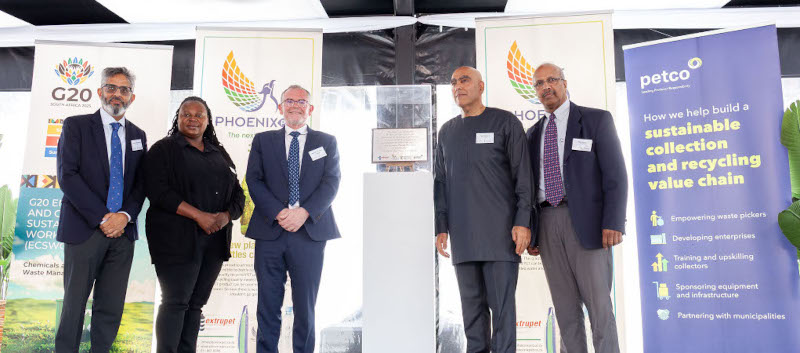Extrupet expands PET bottle-to-bottle recycling with new Cape Town plant
On 6 October, South Africa’s plastics recycling sector received a major boost with the official opening of Extrupet’s second PET bottle-to-bottle recycling facility — and the first of its kind in the Western Cape. Located at the company’s Propet plant in Cape Town, the new facility began commercial production in March 2025 and is set to add 15,000 tonnes of recycled PET (rPET) to the market each year.
Speaking at the launch, the Minister of Forestry, Fisheries and the Environment, Dr Dion George, said that plastic pollution was not only an environmental issue but also a public health concern that harmed communities and threatened ecosystems. “Through the Intergovernmental Negotiating Committee, we are advocating for a legally binding instrument that covers the full life cycle of plastics — from design and production through to consumption, reuse and disposal,” he said.
Although international negotiations have stalled, Dr George emphasised that South Africa would continue to lead by example. The government is creating an enabling regulatory environment, while industry players such as Extrupet are turning policy into tangible action through investment in increased recycling capacity.“This facility is more than bricks and machinery; it is a symbol of how South Africa can turn a crisis into an opportunity. It shows that with clear policy, vision and partnership, plastic waste can be transformed from an environmental burden into a driver of jobs, innovation and inclusive growth.”
The minister also highlighted the role of PET as one of the most visible and valuable materials in the waste stream, providing income opportunities for many South African waste pickers and small businesses.
“If we collect PET properly, it supports livelihoods and builds enterprises. If we do not, it ends up in landfills, rivers and oceans. That is the choice before us, and this facility tilts the balance towards opportunity,” he said.
Expanding recycling capacity
Extrupet established its first bottle-to-bottle recycling line at its Johannesburg plant in 2009, followed by additional lines in 2014 and 2020. The latest facility in Cape Town marks the first stage of a two-phase expansion that will eventually double the company’s food-grade rPET output capacity.
“This line represents phase one, which takes our total output from 30,000 to 45,000 tonnes this year,” explained Extrupet’s joint managing director, Chandru Wadhwani. “Next year, we hope to launch phase two with new machinery, which will see us producing 60,000 tonnes of rPET nationwide that meets international food-grade standards.”
Wadhwani described PET — or polyethylene terephthalate — as one of the few plastics capable of true circularity, where bottles can be safely recycled back into new food-grade products, keeping the material in circulation at its highest value for as long as possible. “With our increased rPET capacity, we can process more plastic waste and strengthen South Africa’s position as a circular economy leader in Africa and globally. Our new plant stands as a beacon of hope in finding practical solutions to mitigate plastic pollution,” he said.
Collaboration and impact
Wadhwani also emphasised Extrupet’s long-standing collaboration with the country’s producer responsibility organisation, Petco. For over two decades, the partnership has supported balanced PET collection and recycling systems, while stimulating market demand for recycled materials. With approximately 70% of PET beverage bottles placed on the market by Petco members currently being recycled, Wadhwani said there was cause for optimism, despite the lack of progress in global negotiations towards a binding international plastics treaty.
“For the past three years, the United Nations has been trying to reach agreement on measures to mitigate plastic pollution. Because we still don’t have clarity on the way forward, the responsibility falls back on individual countries and companies to take the necessary action,” he noted. “We are proud that South Africa has implemented Extended Producer Responsibility (EPR) legislation. This means that, by law, producers and brand owners must take responsibility for their packaging waste throughout its entire life cycle — from design to disposal.”
Supporting circular value chains
Petco CEO Telly Chauke said the organisation’s primary function was to support EPR implementation and help producers meet legislated collection and recycling targets. “Key infrastructure investments like this one ensure the availability of food-grade rPET at scale for local producers, who must also meet increasing requirements for recycled content in their packaging,” Chauke explained. She added that the new Western Cape facility would benefit the province’s agricultural sector in particular, as export punnets destined for European markets must contain at least 25% certified rPET under new EU regulations.
“It is encouraging to see regional recycling value chains strengthened by investments such as these,” Chauke said. “For recycling to succeed, the economics must work. Having facilities in key regions like the Western Cape reduces the cost and complexity of transporting bottles across the country for reprocessing.” Chauke also highlighted the role of consumers in driving recycling success. “It’s not only up to business and government — consumers can help by choosing products in recyclable packaging and by separating recyclables from general household waste to create clean feedstock for plants like this.”
Building a circular future
With its new Cape Town facility, Extrupet takes another step towards closing the PET loop in South Africa. The investment strengthens regional recycling infrastructure, supports compliance with international standards and demonstrates how industry collaboration, regulation and innovation can jointly advance the circular economy.

